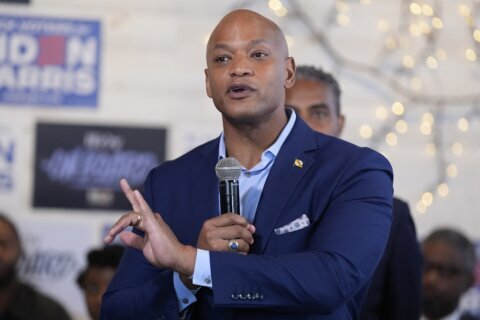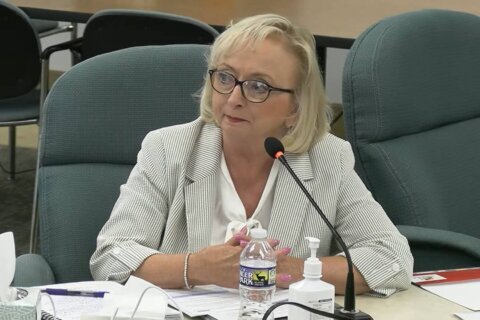This article was republished with permission from WTOP’s news partners at Maryland Matters. Sign up for Maryland Matters’ free email subscription today.
This content was republished with permission from WTOP’s news partners at Maryland Matters. Sign up for Maryland Matters’ free email subscription today.
Ben Cardin (D), Maryland’s senior U.S. senator and one of the longest-serving elected officials in American history, does not plan to seek reelection in 2024.
Cardin’s office put out a statement and video announcing his decision at noon on Monday, and he elaborated on his plans during a midday speech at the Baltimore County Bar Association’s Law Day ceremony in Towson.
“It’s an unusual day for me,” Cardin told the audience.
By the time he leaves the Senate in January 2025, Cardin, 79, will have served in elective office for 58 consecutive years. He was elected to the House of Delegates in 1966 at the age of 22, while still in law school, filling a seat based in northern Baltimore City that had been held for decades by his uncle (his father had also briefly been a state lawmaker, then served as a judge).
“It’s been an incredible journey,” he said in an interview at the Baltimore County courthouse following his Law Day speech. “I love Maryland. I love representing the state. I love every part of it. I’ve loved every job I’ve had, especially being in the United States Senate. I’m really happy with what I’m doing in the Senate, with all my positions. But the reality is, [I’ll have served] 58 years after this term. If I served one more term I’d be 87 years old.
“If I think of where I was six years ago compared to today, I’m not climbing the mountains as fast as I used to. Times change and I recognize that. I’d rather do this on my terms. But it’s not retirement. I expect to continue to follow my passions after I’m in elective office.”
Cardin never lost any of his 36 elections (18 primaries and 18 general elections), and his decision to end his political career is sure to set off an immediate scramble in the Democratic Party to replace him — and create a domino effect in Maryland politics.
Prince George’s County Executive Angela Alsobrooks (D) and U.S. Rep. David Trone (D-6th) have already assembled political teams for Senate campaigns, and Montgomery County Councilmember Will Jawando (D) is also preparing to run. Others who are expected to consider the Senate race include U.S. Rep. Jamie Raskin (D-8th), Baltimore County Executive Johnny Olszewski Jr. (D), U.S. Rep. John Sarbanes (D-3rd) and Ben Jealous, the party’s 2018 gubernatorial nominee who is currently executive director of the national Sierra Club.
National Republicans are likely to pressure former Gov. Larry Hogan to enter the Senate race, but he has expressed no interest in serving in the Senate in the past — though associates say he misses the political limelight since leaving office in mid-January and foregoing a 2024 White House bid.
The reality, though, is that unless Hogan is their nominee, Republicans will be heavy underdogs in the race to replace Cardin, especially in a presidential election year.
Cardin said he has spoken to all of the potential Democratic candidates for his seat and is grateful that they gave him the courtesy of waiting on his decision before disclosing any of their plans for 2024. Asked if he planned to endorse anyone in the Democratic primary, he replied, “I don’t think that’s going to happen.”
While Cardin’s longevity is remarkable, he has done consequential work throughout his career. While an unrepentant liberal, Cardin is soft-spoken, cerebral, and willing to work across the aisle — though he has become more caustic about Republicans since Donald Trump came on the political scene.
Cardin has been sharply critical of the “disinformation” being peddled by “election deniers and conspiracy theorists.” Coincidentally, his speech to the bar association, which had been scheduled long before he made any decisions about his political future, was about the importance of civics and civility in politics.
“It is moving in the wrong direction,” he lamented. “I worry about leaders not leading.”
Cardin said the current trends in politics are in sharp contrast to his own career.
“My guiding principle has been the need to get things done,” he said. “And you’ve got to compromise to get things accomplished.”
A consequential career
In the House of Delegates, Cardin rose to become chair of the Ways and Means Committee at the age of 31 and House speaker four years later. He pushed through property tax reform and school funding formula measures in Annapolis and also increased ethical standards for state elected officials.
In 1986, Cardin eyed the open-seat gubernatorial election, but like many ambitious politicians of that era, he deferred to William Donald Schaefer (D) when the voluble, colorful mayor of Baltimore decided to run for governor. Instead, Cardin set his sights on the U.S. House seat in the Baltimore area held by Barbara Mikulski (D) when Mikulski ran for U.S. Senate in 1986. He was elected easily.
Early in his U.S. House career, Cardin was assigned to the Ways and Means Committee, where he became steeped in tax policy and authored bipartisan legislation to expand retirement programs like 401k investment plans.
In 2005, when Paul Sarbanes (D), Maryland’s senior senator, announced that he would not be seeking a sixth term the following year, Cardin quickly jumped into the race to succeed him, narrowly winning the Democratic primary over Kweisi Mfume, his former House colleague, and then besting then-Lt. Gov. Michael Steele (R) in the general election by 10 points. At the time of Cardin’s election to the Senate, he was the longest-serving House member in U.S. history to move up to the Senate.
Cardin currently chairs the Senate Committee on Small Business and Entrepreneurship, where he played an integral role in establishing the Paycheck Protection Program to help businesses and their workers through the worst of the pandemic’s economic slowdown. As a senior member of the Environment and Public Works Committee, Cardin is the No. 1 champion on Capitol Hill for protecting the health of the Chesapeake Bay, and he has used his post on the Foreign Relations Committee to advocate for human rights across the globe. He has also successfully pushed to add dental care to many federal health care programs for low-income Americans.
Cardin’s political plans have been the object of intense speculation in Maryland and on Capitol Hill, but even as the general consensus among political professionals was that he would opt for retirement, he has shown no signs of slowing down. He led the recent unsuccessful fight in the Senate to extend the congressional deadline for ratifying the Equal Rights Amendment, and he maintains a jam-packed schedule of events in Maryland. Immediately after his speech in Towson Monday, Cardin was scheduled to appear at two events in Montgomery County with an array of other — and younger — elected officials, including at least two who are eyeing his job: Trone and Jawando.
Cardin said he’s looking forward to the remaining 20 months of his term, unencumbered by the need to raise money and hit the campaign trail. He said he has several priorities for the months ahead, including helping small businesses get stronger in an era of economic uncertainty, continuing to make progress on the Bay, expanding the availability of telehealth services, and doing more to shore up Baltimore City.
Not running for reelection “frees you up to focus on your priorities because you don’t have to worry about the campaign and the fundraising,” Cardin said. He added that what he’s learned from former colleagues is that “your opportunities [to accomplish things] are maybe even stronger in the last two years.”







